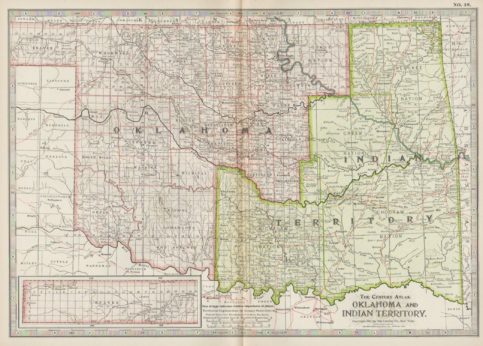
Half the state of Oklahoma may revert back to the 1866 Treaty Muscogee Creek boundaries due to a congressional oversight. The Supreme Court of the United States last week announced they would hear the case this fall in Royal vs. Murphy. Justice Neil Gorsuch is recused from the case, because he participated in earlier proceedings in the case while he was still a judge on the 10th Circuit.
As the SCOTUS blog states, the issue arises in the case of Patrick Murphy, a member of the Creek Nation who was convicted and sentenced to death in Oklahoma state court for the murder of another member of the same nation. After his sentence was upheld on appeal, Murphy returned to the state courts seeking post-conviction relief: He argued that the federal government, rather than Oklahoma, has authority to prosecute him because both he and his victim were Indians and the crime occurred in Indian country. That argument was unsuccessful in the state courts, but when Murphy went to federal court, the U.S. Court of Appeals for the 10th Circuit agreed, reasoning that Congress had never disestablished—that is, terminated—the boundaries of the Creek Nation.

The SCOTUS decision could affect the eastern half of the state of Oklahoma for the Muscogee, Choctaw, Cherokee, Chickasaw and Seminole Nations. For the Muscogee Creek Nation (MCN) it could signify the rights to collect property taxes, expand their tribal police jurisdiction as well as have their own court system.
In April the MCN Lighthorse Police traveled to Navajo Nation for cross training in light of the potential ruling on the Murphy case. Robert Hawkins, MCN Lighthorse Department Chief, said, “We’re trying to be ahead of everything. We don’t want to be behind the eight ball if this decision is upheld,” Hawkins said. “I want my officers as well prepared as we can be to possibly take on this task.”
“We’re going to have a chance to see how their operation works, from the chief of police all the way down,” Hawkins said. “Their reservation covers a three-state area, so it’s very vast. I feel like it’s going to make our agency better prepared to see how a major reservation law enforcement operation is run and compare it to our plan.”
MVSKOKE Media said, in a February 6, 2018 article, that in the latter half of 2017, the U.S. 10th Circuit Court of Appeals ruled that Congress had not disestablished the MCN reservation created by an 1866 treaty, and therefore the State of Oklahoma lacked the jurisdiction to try and sentence Murphy for murder because he is a Muscogee (Creek) citizen and the crime occurred in Indian Country. The U.S. Code Title 18, titled “Crimes and Criminal Procedure,” Section 1151, defines Indian Country as all land within the limits of a reservation as well as allotments that still hold their Indian titles.
Murphy’s attorneys state the Dawes Commission never obtained an agreement to cede land from MCN. “But the Creek negotiated to avoid cession,” their brief states, “ensuring the entire body of Creek lands would remain intact and (with limited exceptions) be allotted to Creek citizens, and that the 1901 agreement would include no language characteristic of disestablishment, such as ‘[e]xplicit reference to cession’ to the United States, a commitment ‘to compensate the tribe for its land with a fixed sum,’ or language restoring lands to ‘the public domain.’”
MVSKOKE Media reported that the U.S. Department of Justice has filed a brief with the Supreme Court, agreeing with the State of Oklahoma. “Contrary to the court’s view, Congress disestablished the Creek Nation’s historic territory when, in preparation for and granting Oklahoma statehood, it broke up and allotted Creek Nation’s lands, displaced tribal jurisdiction, and provided for application of state law and state jurisdiction,” the DOJ brief states.

The State of Oklahoma contends that it has the potential of splitting the state into two territories in their brief filed earlier this year. The decision “threatens to disrupt the distribution of governmental authority in nearly half of Oklahoma,” attorneys state in a brief submitted on behalf of the United States.
Murphy’s attorneys go on to state that “while Oklahoma after statehood indeed asserted absolute criminal and civil jurisdiction, it did so in defiance of Congress’s statutes, in furtherance of one of this country’s most shameful episodes of plunder and exploitation.”
The Muscogee Nation will exercise their sovereignty to the fullest possible extent. Kevin Dellinger, MCN attorney general, said, “We welcome the chance for the United States Supreme Court to affirm the Muscogee (Creek) Nation’s sovereign territorial boundaries as established in our 1866 treaty with the United States. The Tenth Circuit Court of Appeals’ legally correct and historically accurate decision is based on a conservative assessment of the historical fact.”
The SCOTUS hearing this fall will be watched by many throughout Indigenous country.
For a brief sketch of the history of the Muscogee people see here.










